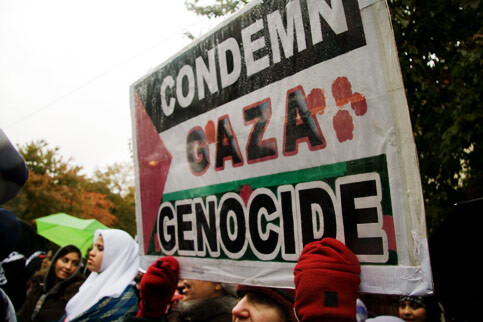The Electronic Intifada 23 October 2009

Protesters demonstrated in the rain outside of the University of Chicago lecture hall where activists inside disrupted Olmert’s speech, 15 October 2009. (Maureen Clare Murphy)
If former Israeli Prime Minister Ehud Olmert had merely been a diplomat or an academic offering a controversial viewpoint, then interrupting his 15 October speech at University of Chicago’s Mandel Hall would certainly have been an attempt to stifle debate (Noah Moskowitz, Meredyth Richards and Lee Solomon, “The importance of open dialogue,” Chicago Maroon, 19 October 2009). Indeed, I experienced exactly such attempts when my own appearance at Mandel Hall last January, with Professor John Mearsheimer and Norman Finkelstein, was constantly interrupted by hecklers.
But confronting a political leader suspected of war crimes and crimes against humanity cannot be viewed the same way.
The report of the UN Fact Finding Mission on the Gaza Conflict last winter, headed by Judge Richard Goldstone, found that Israel engaged in willful, widespread and wanton destruction of civilian property and infrastructure, causing deliberate suffering to the civilian population. It found “that the incidents and patterns of events considered in the report are the result of deliberate planning and policy decisions” and that many may amount to “war crimes” and “crimes against humanity.” If that proves true, then the individual with primary responsibility is Ehud Olmert, who, as prime minister and the top civilian commander of Israel’s armed forces, was involved in virtually every aspect of planning and execution.
The killings of more than 3,000 Palestinians and Lebanese during Olmert’s three years in office are not mere differences of opinion to be challenged with a polite question written on a pre-screened note card. They are crimes for which Olmert is accountable before international law and public opinion.
Israel, unlike Hamas (also accused of war crimes by Goldstone), completely refused to cooperate with the Goldstone Mission. Instead of accountability, Olmert is, obscenely, traveling around the United States offering justifications for these appalling crimes, collecting large speaking fees, and being feted as a “courageous” statesman.
In their 20 October email to the University of Chicago community, President Robert Zimmer and Provost Thomas Rosenbaum condemned the “disruptions” during Olmert’s speech. “Any stifling of debate,” they wrote, “runs counter to the primary values of the University of Chicago and to our long-standing position as an exemplar of academic freedom.”
Was it in order to promote debate that the University insisted on pre-screening questions and imposed a recording ban for students and media? In the name of promoting debate, will the University now invite Hamas leader Khaled Meshal — perhaps by video link — to lecture on leadership to its students, and offer him a large honorarium? Can we soon expect Sudan’s President Omar Bashir to make an appearance at Mandel Hall?
When I and others verbally confronted Olmert, we stood for academic freedom, human rights, and justice, especially for hundreds of thousands of students deprived of those same rights by Olmert’s actions.
During Israel’s attack on Gaza last winter, schools and universities were among the primary targets. According to the Goldstone report, Israeli military attacks destroyed or damaged at least 280 schools and kindergartens. In total, 164 pupils and 12 teachers were killed, and 454 pupils and five teachers injured.
After the bombing, Olmert and Israel continued their attack on academic freedom, blocking educational supplies from reaching Gaza. Textbooks, notebooks, stationery and computers are among the forbidden items. In September, Chris Gunness, spokesman for UNRWA, the UN agency for Palestine refugees, publicly appealed to Israel to lift its ban on books and other supplies from reaching Gaza’s traumatized students.
Israel destroyed buildings at the Islamic University and other universities. According to the Goldstone report, these “were civilian, educational buildings and the Mission did not find any information about their use as a military facility or their contribution to a military effort that might have made them a legitimate target in the eyes of the Israeli armed forces.”
Gaza’s university students — 60 percent of them women — study all the things that students do at the University of Chicago. Their motivations, aspirations, and abilities are just as high, but their lives are suffocated by unimaginable violence, trauma, and Israel’s blockade, itself a war crime. Olmert is the person who ordered these acts and must be held accountable.
Crimes against humanity are defined as “crimes that shock the conscience.” When the institutions with the moral and legal responsibility to punish and prevent the crimes choose complicit silence — or, worse, harbor a suspected war criminal, already on trial for corruption in Israel, and present him to students as a paragon of “leadership” — then disobedience, if that is what it takes to break the silence, is an ethical duty. Instead of condemning them, the University should be proud that its students were among those who had the courage to stand up.
For the first time in recorded history, an Israeli prime minister was publicly confronted with the names of his victims. It was a symbolic crack in the wall of impunity and a foretaste of the public justice victims have a right to receive when Olmert is tried in a court of law.
Co-founder of The Electronic Intifada, Ali Abunimah is author of One Country: A Bold Proposal to End the Israeli-Palestinian Impasse. This article was originally published in the University of Chicago’s Chicago Maroon newspaper and is republished with permission.
Related Links
- “Olmert visit sparks Palestine movement at US university,” Emily Ratner (20 October 2009)
- “EI exclusive video: Protesters shout down Ehud Olmert in Chicago,” Video by The Electronic Intifada and text by Maureen Clare Murphy (16 October 2009)




